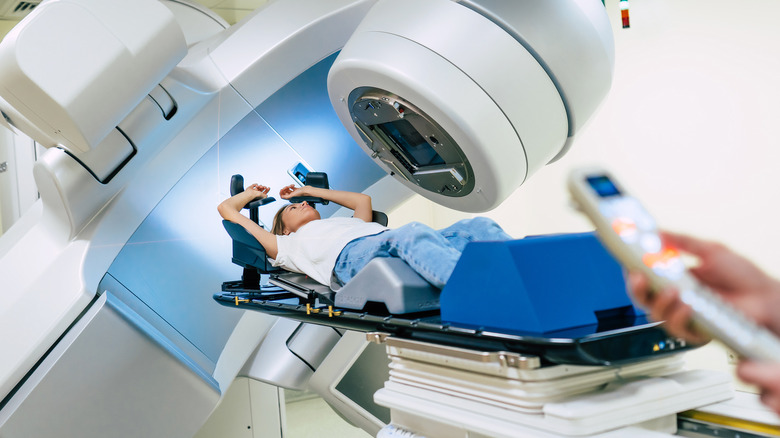Is It Safe To Be Around Someone Going Through Radiation Therapy?
For people undergoing treatment for cancer, one of the go-to methods of treatment is radiation, a method that has demonstrated its effectiveness against cancer cells (via Memorial Sloan Kettering Cancer Center). In fact, Sloan Kettering notes that, in some cases of cancer, radiation therapy may be all that's required to treat it. According to the National Cancer Institute, radiation therapy's effectiveness comes from its ability to affect the DNA of cancer cells. When the cells are damaged, they lose their ability to divide and eventually die off.
However, although it is a common treatment for cancer, radiation is not without its side effects, according to the Emory Winship Cancer Institute. These can include damage to tissues around the tumor, including such organs as the lungs or the heart, as well as possible complications in healing in situations where surgery is required. Because of these side effects and the fact that radiation has the ability to damage cells, there are some people who worry about how safe it may be even for loved ones to be near a person going through treatment.
The type of radiation is important
While caregivers and family members of a person undergoing radiation treatment may have concerns about their safety, the American Cancer Society notes that radiation has been used safely for more than a century. Additionally, there have been advances made over the years that have led to the implementation of regulations to further ensure safety during treatment.
One of the fears that people undergoing radiation therapy experience is that they, upon receiving treatment, will become radioactive themselves, thereby exposing others to radiation through physical contact (via Cleveland Clinic). However, in general, there is little cause for concern when it comes to contact with others. If the patient has received external radiation, meaning that the radiation is delivered outside the body, then there is no risk of exposure to others, as the affected tissues do not retain radiation. However, if you have internal radiation therapy, such as brachytherapy, Cancer Research UK says, then some safety precautions should be taken. During brachytherapy, radiation is inserted directly into the body, delivering a strong dose to the cancerous cells. If your treatment lasts over the course of several days, visitations will be limited and children and pregnant women cannot be near you.
Can you have sex while undergoing treatment?
In some cases of brachytherapy, the radioactive material will remain inside the patient, in the form of a pellet, capsule, wire, or seed (via Memorial Sloan Kettering Cancer Center). In those cases, there can be concerns with being around children, as their bodies are growing and changing and radiation could impact their development. Your doctor can talk to you about the precautions you should take around children. For patients with prostate cancer, small radioactive pellets called "seeds" can be implanted into the prostate, leading to some concerns of radiation contamination during sexual intimacy, per the University of California San Francisco. Sexual relations can continue without issue following the implantation of the seeds, but patients should wear a condom for the first week after the procedure.
For oral radiation, the radioactive materials can be found in your saliva, sweat, blood, and urine (via the American Cancer Society). While you are receiving this treatment, it's advisable that your laundry, including towels and sheets, be kept separate from the rest of your household. In addition, you should always sit down when using the toilet and flush twice after every use. Patients receiving oral radiation should also avoid infants, children, and pregnant women and refrain from intimate contact (including kissing).
Because radiation treatment can vary depending on the patient and the type of cancer being treated, you should consult with your team of cancer care professionals to employ the best possible safety precautions for your specific situation.


